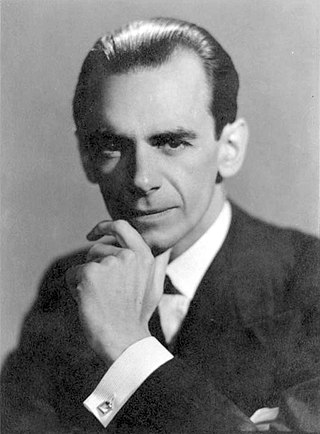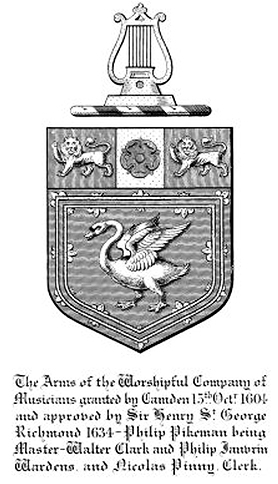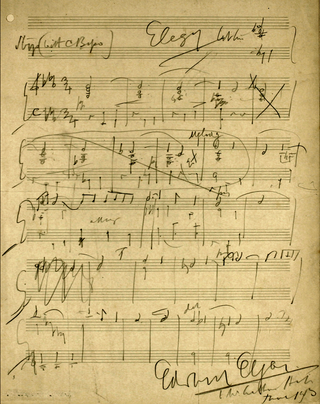Related Research Articles

Sir Edward William Elgar, 1st Baronet, was an English composer, many of whose works have entered the British and international classical concert repertoire. Among his best-known compositions are orchestral works including the Enigma Variations, the Pomp and Circumstance Marches, concertos for violin and cello, and two symphonies. He also composed choral works, including The Dream of Gerontius, chamber music and songs. He was appointed Master of the King's Musick in 1924.

The Royal Horticultural Society (RHS), founded in 1804 as the Horticultural Society of London, is the UK's leading gardening charity.

Sir Adrian Cedric Boult, CH was a British conductor. Brought up in a prosperous mercantile family, he followed musical studies in England and at Leipzig, Germany, with early conducting work in London for the Royal Opera House and Sergei Diaghilev's ballet company. His first prominent post was conductor of the City of Birmingham Orchestra in 1924. When the British Broadcasting Corporation appointed him director of music in 1930, he established the BBC Symphony Orchestra and became its chief conductor. The orchestra set standards of excellence that were rivalled in Britain only by the London Philharmonic Orchestra (LPO), founded two years later.

Sir John Barbirolli was a British conductor and cellist. He is remembered above all as conductor of the Hallé Orchestra in Manchester, which he helped save from dissolution in 1943 and conducted for the rest of his life. Earlier in his career he was Arturo Toscanini's successor as music director of the New York Philharmonic, serving from 1936 to 1943. He was also chief conductor of the Houston Symphony from 1961 to 1967, and was a guest conductor of many other orchestras, including the BBC Symphony Orchestra, London Symphony Orchestra, the Philharmonia, the Berlin Philharmonic and the Vienna Philharmonic, with all of which he made recordings.

Royal Liverpool Philharmonic is a music organisation based in Liverpool, England, that manages a professional symphony orchestra, a concert venue, and extensive programmes of learning through music. Its orchestra, the Royal Liverpool Philharmonic Orchestra, is the UK's oldest continuing professional symphony orchestra. In addition to the orchestra, the organisation administers the Royal Liverpool Philharmonic Choir, the Liverpool Philharmonic Youth Company and other choirs and ensembles. It is involved in educational and community projects in Liverpool and its surrounding region. It is based in the Liverpool Philharmonic Hall, an Art Deco concert hall built in the late 1930s.

The Royal College of Music is a conservatoire established by royal charter in 1882, located in South Kensington, London, UK. It offers training from the undergraduate to the doctoral level in all aspects of Western Music including performance, composition, conducting, music theory and history, and has trained some of the most important figures in international music life. The RCM also undertakes research, with particular strengths in performance practice and performance science.

Sir Henry Joseph Wood was an English conductor best known for his association with London's annual series of promenade concerts, known as the Proms. He conducted them for nearly half a century, introducing hundreds of new works to British audiences. After his death, the concerts were officially renamed in his honour as the "Henry Wood Promenade Concerts", although they continued to be generally referred to as "the Proms".
Master of the King's Music is a post in the Royal Household of the United Kingdom. The holder of the post originally served the monarch of England, directing the court orchestra and composing or commissioning music as required.

Julian Lloyd Webber is a British solo cellist, conductor and broadcaster, a former principal of Royal Birmingham Conservatoire and the founder of the In Harmony music education programme.

Sir Edward German was an English musician and composer of Welsh descent, best remembered for his extensive output of incidental music for the stage and as a successor to Arthur Sullivan in the field of English comic opera. Some of his light operas, especially Merrie England, are still performed.

Sir Harold Malcolm Watts Sargent was an English conductor, organist and composer widely regarded as Britain's leading conductor of choral works. The musical ensembles with which he was associated included the Ballets Russes, the Huddersfield Choral Society, the Royal Choral Society, the D'Oyly Carte Opera Company, and the London Philharmonic, Hallé, Liverpool Philharmonic, BBC Symphony and Royal Philharmonic orchestras. Sargent was held in high esteem by choirs and instrumental soloists, but because of his high standards and a statement that he made in a 1936 interview disputing musicians' rights to tenure, his relationship with orchestral players was often uneasy. Despite this, he was co-founder of the London Philharmonic, was the first conductor of the Liverpool Philharmonic as a full-time ensemble, and played an important part in saving the Royal Philharmonic Orchestra from disbandment in the 1960s.

The Worshipful Company of Musicians is one of the Livery Companies of the City of London. Its history dates back to at least 1350. Originally a specialist guild for musicians, its role became an anachronism in the 18th century, when the centre of music making in London moved from the city to the West End, and for more than a century it was a general guild for figures in the city, with no specific musical role. In the late 19th century, the musical element was revived, and the modern Company promotes all aspects of the art and science of music.

Sir Ernest Alexander Campbell MacMillan, was a Canadian orchestral conductor, composer, organist, and Canada's only "Musical Knight". He is widely regarded as being Canada's pre-eminent musician from the 1920s through the 1950s. His contributions to the development of music in Canada were sustained and varied, as conductor, performer, composer, administrator, lecturer, adjudicator, writer, humourist, and statesman.

The Royal Philharmonic Society (RPS) is a British music society, formed in 1813. Its original purpose was to promote performances of instrumental music in London. Many composers and performers have taken part in its concerts. It is now a membership society, and while it no longer has its own orchestra, it continues a wide-ranging programme of activities which focus on composers and young musicians and aim to engage audiences so that future generations will enjoy a rich and vibrant musical life. Since 1989, the RPS has promoted the annual Royal Philharmonic Society Music Awards for live music-making in the United Kingdom.

The National Youth Orchestra of Great Britain (NYO-GB) is the national youth orchestra of the United Kingdom, consisting of 164 members of ages 13 to 19 years. Auditions take place in the autumn each year at various locations in the country. The minimum standard needed to audition is ABRSM / Trinity Guildhall / London College of Music Grade 8 Distinction, though it is not necessary to have taken any examinations. In 2011, the orchestra was shortlisted for the Royal Philharmonic Society's Best Ensemble Award. In 2012, the NYO received the Queen's Medal for Music. In 2015 the NYO received the Royal Philharmonic Society's Ensemble award, which recognized particularly the launch of NYO Inspire as well as their other work.
The National Federation of Music Clubs (NFMC) is an American non-profit philanthropic music organization that promotes American music, performers, and composers. NFMC endeavors to strengthen quality music education by supporting "high standards of musical creativity and performance." NFMC headquarters are located in Greenwood, Indiana. Since its founding in 1898, the NFMC has grown into one of the world’s largest music organizations with club and individual members of all ages. The NFMC is chartered by the Congress of the United States, and is the only music organization member of the United Nations.

John Alexander Fuller Maitland was an influential British music critic and scholar from the 1880s to the 1920s. He encouraged the rediscovery of English music of the 16th and 17th centuries, particularly Henry Purcell's music and English virginal music. He also propounded the notion of an English Musical Renaissance in the second half of the 19th century, particularly praising Charles Villiers Stanford and Hubert Parry.

Derby Choral Union is one of the UK’s longest standing choral societies having been formed in 1866. The choir was established to perform choral music of the highest quality, a tradition it strives to maintain to this day. The repertoire includes traditional choral works as well as music by 20th-century and more contemporary composers. Derby Choral Union is a registered charity and an independent choral society. It promotes concerts in Derby, England, and the surrounding district, and has over 100 active members.

Oxford Harmonic Choir is a large, mixed-voice amateur choir based in Oxford, England. It is the second-oldest non-collegiate choir in Oxford, having been founded in 1921, and according to The New Grove Dictionary of Music and Musicians is one of the "institutions of lasting significance to Oxford's musical life that were established during this period". Currently the choir has around 150 singing members and usually performs three concerts annually in either the Sheldonian Theatre or Oxford Town Hall with the Orchestra of Stowe Opera.

Elegy, Op. 58 is a short piece for string orchestra by Edward Elgar, composed in 1909. It was written in response to a request for a short piece to commemorate deceased members of the Worshipful Company of Musicians. The work was composed within a month of the death of his close friend August Jaeger and may reflect Elgar's grief at his loss.
References
- ↑ "The Black Knight". Elgar Society. Retrieved 18 November 2021.
- 1 2 "Elgar Society Awards". Elgar Society. Archived from the original on 7 April 2020. Retrieved 26 May 2021.